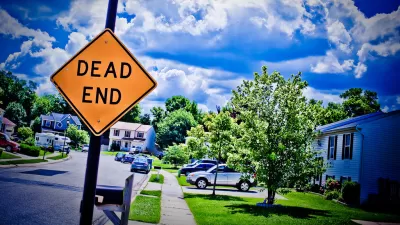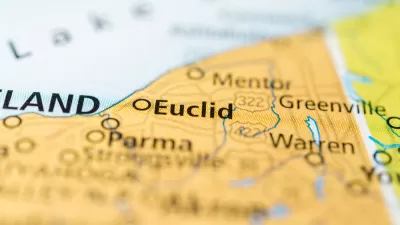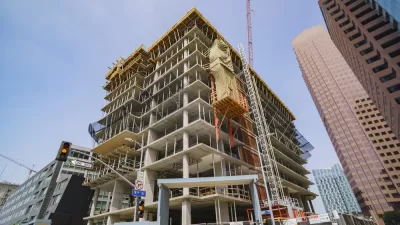Aaron Renn presents a new model for conceptualizing the health of the many layers of communities that make up metropolitan regions, namely the "new donut."
The "old donut: "The idea being that you can’t have a smoking hole in your region where your downtown is supposed to be." Decades of reinvestment and an influx of residents to urban cores, however, have created a new model, according to Renn, in which the "old donut" has been filled in, leaving a "new donut":
In this model, the old donut is inverted. What used to be the ring of health – the outer areas of the city and the inner suburban regions – are now struggling. Whereas the downtown is in pretty good shape, and the newer suburban areas are booming.
But here's the rub: "We’ve got three decades of experience in downtown revitalization, but much less in dealing with this newer challenge zone." The challenges of reinvesting in such a "newer challenge zone" are numerous, according to Renn:
These areas have an inferior housing stock (often small post-war worker cottages or ranches), sometimes poor basic infrastructure, and are sometimes independent municipalities that, like Ferguson, MO, are often overlooked unless something really bad happens. Unlike the major downtown, they are often “out of sight, out of mind” for most regional movers and shakers.
Renn's coverage also includes more about the implications of the new model and recommends first steps in addressing the challenges created by the "new donut."
Writing for Corner Side Yard, Pete Saunders picks up on Renn's article and recommends a thought experiment for the metropolitan area of Chicago that he uses to show the unintended, and undesirable, consequences of a potential response to Renn's new model: a ban on exclusionary zoning.
FULL STORY: The New Donut

Maui's Vacation Rental Debate Turns Ugly
Verbal attacks, misinformation campaigns and fistfights plague a high-stakes debate to convert thousands of vacation rentals into long-term housing.

Planetizen Federal Action Tracker
A weekly monitor of how Trump’s orders and actions are impacting planners and planning in America.

In Urban Planning, AI Prompting Could be the New Design Thinking
Creativity has long been key to great urban design. What if we see AI as our new creative partner?

Portland Raises Parking Fees to Pay for Street Maintenance
The city is struggling to bridge a massive budget gap at the Bureau of Transportation, which largely depleted its reserves during the Civd-19 pandemic.

Spokane Mayor Introduces Housing Reforms Package
Mayor Lisa Brown’s proposals include deferring or waiving some development fees to encourage more affordable housing development.

Houston Mayor Kills Another Bike Lane
The mayor rejected a proposed bike lane in the Montrose district in keeping with his pledge to maintain car lanes.
Urban Design for Planners 1: Software Tools
This six-course series explores essential urban design concepts using open source software and equips planners with the tools they need to participate fully in the urban design process.
Planning for Universal Design
Learn the tools for implementing Universal Design in planning regulations.
Gallatin County Department of Planning & Community Development
Heyer Gruel & Associates PA
JM Goldson LLC
City of Camden Redevelopment Agency
City of Astoria
Transportation Research & Education Center (TREC) at Portland State University
Jefferson Parish Government
Camden Redevelopment Agency
City of Claremont





























